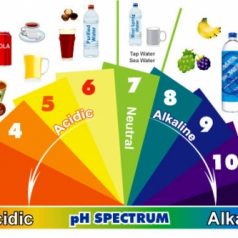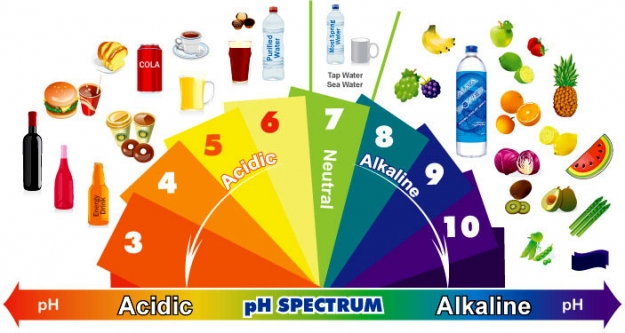

Modern agricultural and industrial practices have altered the acidity of our environment and the foods we produce and eat. This raises concerns that our bodies are being overloaded with acidity, negatively affecting our bones. However, the human body has systems in place that control the acidity of our blood within a tight range, but is that enough? Do we need to consume products such as alkaline water and green food powders to maintain balance?
As with every miracle food fad, companies leapt on the chance to market products intended to rescue your body from “toxic acidity” caused by a typical western diet high in refined carbohydrates, meats, and dairy. These are demonized as “acid-producing” foods that take calcium from your bones. However, are these products based in science? Or are they just a product of speculation and hype?
Acidity in and of itself is often a positive thing. Our skin is naturally acidic to stop bacterial growth. Our stomachs become the most acidic site of our body to initiate normal digestion processes. In fact, essential nutrients such as protein, iron, and calcium require acidic conditions to be effectively digested and absorbed. Once protein, fat, and carbohydrates are metabolized for energy, acidic byproducts are formed. This is normal. Then it is the job of the kidneys and lungs to remove that excess acidity to keep blood pH within the normal range. Grains, meats, and dairy do increase acidity of the urine, but not that of the blood. Why? Our lungs and kidneys do an amazing job of eliminating the flux of acid.
Calcium, phosphate, and bicarbonate act as part of the complex buffer system in our blood and are major components of our skeletal system. Higher blood acidity (or lower pH) leads to release of these compounds from bone and higher urinary calcium losses, but this doesn’t necessarily lead to decreased bone mineral density. As long as dietary calcium and vitamin D are sufficient, the intestine can compensate for these losses by increasing calcium absorption efficiency.
Supplementation with phosphate, thought to be an “acid-producing” nutrient, has actually been correlated with decreased urinary calcium losses. Dairy products are high in phosphate and calcium. The potential benefits from these products are in opposition to the theories of the alkaline diet.
Other contributors to calcium excretion are dietary sodium and potassium. High sodium intake has been correlated with increased urinary calcium, and high potassium intake has been correlated with decreased urinary calcium. Unfortunately, the average American diet is high in sodium and low in potassium, potentially increasing our need for dietary calcium.
This may all seem complicated, but the solution is actually straightforward. The alkaline diet promotes increased consumption of fruits and vegetables for their “acid-reducing” properties, which likely does have an impact on body pH balance, but that’s no surprise. We have known all along that a diet rich in whole grains, lean meats, and fruits and vegetables leads to better health outcomes. Dairy products support bone health and actively avoiding them is doing yourself a disservice. While the spirit of the alkaline diet might be in the right place, you don’t need special supplements or a hyped-up rationale to eat healthy.
Article courtesy of Brett Loman, U of I Dietetic Intern
